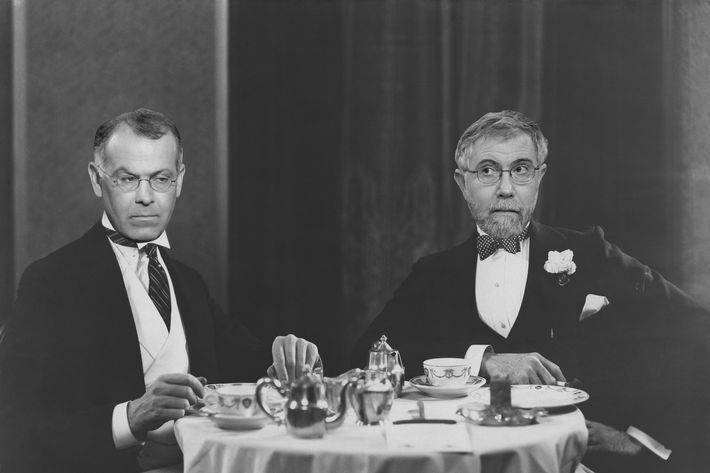
There was once a time, a happy time, when readers of the New York Times could turn to Paul Krugman for their economic analysis, and to Nate Silver for their electoral and sports forecasting, and everybody lived in harmony. Now these are confusing times. Silver has left the Grey Lady and come under increasingly sharp attack from Krugman. Now Silver has written a snarky item questioning Krugman’s motives for questioning him. Why have the two great icons of the liberal nerd elite turned against each other?
Silver’s theory is simple: Krugman is attacking him because he’s left the Times. In a mocking post, Silver charts Krugman’s references to his work, plotting a correlation between their positivity and Silver’s status as a colleague, and revealing that Krugman “has expressed substantially more negative sentiments about FiveThirtyEight since it left The New York Times.”
The statistical trend is real enough, but Silver’s theory to explain the data doesn’t hold up. Somewhere, David Brooks is reading Silver’s argument that Paul Krugman refuses to attack his colleagues and laughing bitterly.

Whatever you want to say about Krugman, he does not let collegiality, or anything else, suppress his instinct to criticize. You can go back to this 1997 New York Times story (predating Krugman’s hiring at the Times) describing the bitter feud between Krugman and his MIT colleague Lester Thurow, who requested, upon Krugman’s return to MIT after a stint at Stanford, that he “refrain from disparaging his MIT colleagues.”
The key to understanding Krugman’s feuds is that he is driven by a very particular kind of professional elitism that can cut in two directions. He rose to fame as a public intellectual in 1994 as the author of “Peddling Prosperity,” which was both a popular primer about economic policy and a lacerating attack on what Krugman called “policy entrepreneurs,” his term for non-economists who sold politicians on simplistic but false economic remedies. Krugman reserved his deepest ire for supply-siders on the right, but partially balanced that out with attacks on liberals like Robert Reich. Krugman’s premise was explicitly elitist: He believed economic policy needed to stay in the hands of real economists, not amateurs with spreadsheets.
Krugman’s attack on the credentials of populist liberals like Reich made him nearly as much of a hate figure on the left as the right. A 2001 cover story by Robert Kuttner in the liberal American Prospect called him “the conservative’s ideal liberal.” It was decorated with a cartoon depicting Krugman in the trench coat of a seamy peddler, or perhaps a flasher.
Krugman has since rocketed to higher levels of fame by assailing the phony economics of the Bush administration in the last decade, and then, what he called the “Very Serious People,” who clung to superstitious fears of debt and inflation in the face of overwhelming evidence that the economy needed more demand. Krugman’s first incarnation positioned him as a snobbish defender of the economic elite, and his more recent incarnation, as a populist critic. But they both reflect a very particular kind of veneration for credentialed economic expertise.
And this, of course, is what explains his newfound disdain for Silver. Krugman happily cheered on his nerdish ally when Silver was confining himself to electoral modeling. But he was already looking at Silver askance, even before he left the Times, when Silver ventured beyond his narrow specialty.
The real cause of Krugman’s disdain is the sheer ambition of Silver’s new venture. Silver’s great added value was to bring basic statistical literacy to the fields of political forecasting and sports commentary, which are dominated by old-line hacks who rely on horse sense and either disdain data in any form or use data very badly.
The new FiveThirtyEight tries to expand this revelatory contribution to other fields. The trouble is that many of those fields, like economics and climate science, already have real experts. Silver’s role, at least in its crudest form, represents the kind of autodidactism that Krugman rose to fame decrying. His war against Silver is nothing terribly new, but merely the return of an old love, or, more accurately, an old hate.






























